新概念第一册Lesson 共
新概念第一册Lesson101-102课件

• G: What? Speak up. Penny. I'm afraid I can't hear you
• P: He say he'll write a letter soon.
•
He hopes we are all well. 'Love, Jimmy.'
• G: Is that all? He doesn't say very much, does he?
• written) v. 写
第三页,共37页。
• card n. 明信片,卡片 • post card 明信片
第四页,共37页。
credit card 信用卡
第五页,共37页。
an ID card 身份证
第六页,共37页。
a birthday card
第三十五页,共37页。
在由“祈使句+附加疑问”构成的附加疑问句中, 附加疑问部分一般用 will you, won’t you
Don’t open the door, will you? Give me some cigarettes, will you? Let’s go swimming, shall we? Let us go swimming, will you?
2. they said, ‘our teacher is a good man.’ they said that their teacher was a good
man.
第三十三页,共37页。
二.反意疑问句:
• 定义:表示提问人的看法,但没有把握,需 要对方的证实。
• 结构:陈述句+简短疑问句。
• eg. He is a member of our class.
新概念第一册目录题目

新概念第一册目录题目Lesson 1 Excuse me!对不起!Lesson 2 Is this your…?这是你的……吗?Lesson 3 Sorry,sir. 对不起,先生。
Lesson 4 Is this your…;这是你的……吗?Lesson 5 Nice to meet you. 很高兴见到你。
Lesson 6 What make is it?它是什么牌子的?Lesson 7 Are you a teacher?你是教师吗?Lesson 8 What's your job?你是做什么工作的?Lesson 9 How are you today?你今天好吗?Lesson 10 Look at…看……Lesson 11 Is this your shirt?这是你的衬衫吗?Lesson 12 Whose is this…?This is my/your/his/her…这……是谁的?这是我的/你的/他的/她的……Whose is that…?That ismy/your/his/her…那……是谁的?那是我的/ 你的/他的/她的……Lesson 13 A new dress 一件新连衣裙Lesson 14 What colour is your…?你的……是什么颜色的?Lesson 15 Your passports,please. 请出示你们的护照。
Lesson 16 Are you…你们是……吗?Lesson 17 How do you do?你好!Lesson 18 What are their jobs?他们是做什么工作的?Lesson 19 Tired and thirsty 又累又渴Lesson 20 Look at them!看看他/它们!想要学习的朋友喂我:SYSZCP,高清视频一对一教学,零基础学习!Lesson 21 Which book?哪一本书?Lesson 22 Giveme/him/her/us/them a…给我/他/她/我们/他们一……Which one?哪—……?Lesson 23 Which glasses?哪几只杯子?Lesson 24 Giveme/him/her/us/them some…给我/他/她/我们/他们一些……Which ones?哪些?Lesson 25 Mrs.Smith's kitchen 史密斯太太的厨房Lesson 26 Where is it?它在哪里?Lesson 27 Mrs.Smith's living room 史密斯太太的客厅Lesson 28 Where are they?它们在哪里无前例?Lesson 29 Come in,Amy. 进来,艾米。
新概念英语第一册Lesson119-Lesson120(共43张PPT)
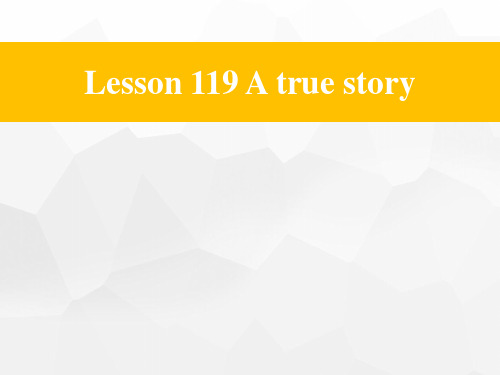
2. _g_o__in__to__=_e_n_t_e_r___意为走进.
3. ___tu_r_n__o_n___意为打开(水、电、气等). 反义词为__tu__rn__o_f_f__ 还有 _t_u_r_n__u_p_开大点 _t_u_r_n__d_o_w_n_关小点
Lesson 119 A true story
Words
1. story / stɔ: ri / n.故事
2. happen
v.发生
3. thief /θi: f / n.小偷
4.enter /
/ v.进入
5. dark /dɑ: k/ adj.黑暗的
6. torch / tɔ: tʃ/ n. 手电筒
had take
future go
now
She __h_a_d__fi_n_i_sh__ed__ the housework before she __w_e_n_t__ out. (finish, go)
had finished went
future now
We __h_a_d__h_ad_ dinner before they__a_r_r_iv_e_d_. (have, arrive)
7. voice /vɔis/ n. 指“人的声音”
8. parrot /
/ n. 鹦鹉
Words
1. story / 'stɔ: ri / 故事
a true story 真实的故事
tell sb a story 讲故事
2. happen
v.发生
sth. happen to sb. 某事发生在某人身上
新版新概念英语第一册课文文档
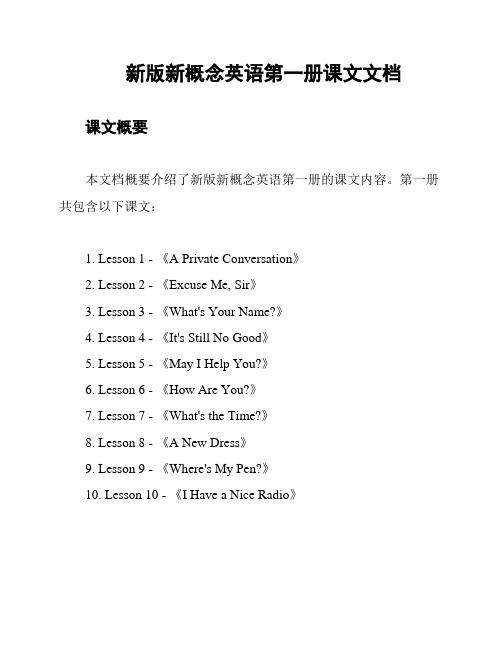
新版新概念英语第一册课文文档课文概要本文档概要介绍了新版新概念英语第一册的课文内容。
第一册共包含以下课文:1. Lesson 1 - 《A Private Conversation》2. Lesson 2 - 《Excuse Me, Sir》3. Lesson 3 - 《What's Your Name?》4. Lesson 4 - 《It's Still No Good》5. Lesson 5 - 《May I Help You?》6. Lesson 6 - 《How Are You?》7. Lesson 7 - 《What's the Time?》8. Lesson 8 - 《A New Dress》9. Lesson 9 - 《Where's My Pen?》10. Lesson 10 - 《I Have a Nice Radio》每课文都包含了一段对话,帮助学生练实际的英语会话。
这些课文涵盖了常见的日常交流场景,旨在帮助学生提高英语口语和听力技能。
除了对话内容,课文还包括了生词和重点词汇,并提供了中文翻译以帮助学生理解。
课文后面还有一些练题,帮助学生巩固所学知识。
使用方法学生可以按照课文的顺序逐一研究。
建议先阅读课文,理解对话内容和词汇意思。
然后,尝试模仿对话中的句子和表达方式,加强口语练。
最后,完成课后练题,检验自己对课文的理解和掌握程度。
建议学生在研究过程中积极参与口语练,可以与同学、朋友或老师进行日常对话练,帮助提高口语表达能力。
研究目标通过研究新版新概念英语第一册的课文,学生将能够:1. 掌握常用的日常交流用语和表达方式。
2. 提高英语听力和口语能力。
3. 增加词汇量,理解并使用生词和重点词汇。
4. 加强对英语语法和句型的理解。
5. 培养研究英语的兴趣和自信心。
参考资料为了更好地研究本课程,建议学生配合使用以下参考资料:1. 《新版新概念英语第一册教材》 - 课文详细内容和练题。
新概念英语第一册lesson1-2PPT课件
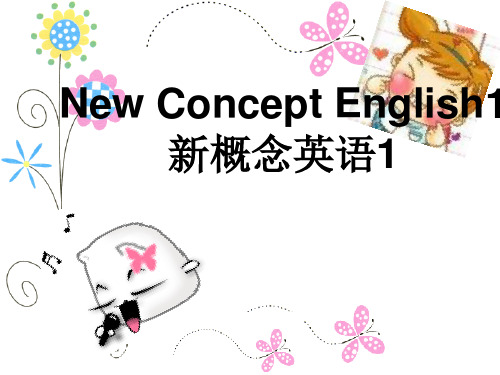
7.Pardon? 对不起,请再说一遍。 I beg your pardon. I beg your pardon? Pardon me?=What did you say?
8.It它,表示动物,天气,时间,距离等 无生命的东西 It’s a cat. It’s cold. It’s two o’clock. It’s far from here. It’s a car.
Nice/Glad/Pleased to see/meet you! meet强调第一次见面. see强调第二次见面,老朋友见面。
Nice to see you ,too./Same here. 见你也很高兴。/我也很高兴。
Long time no see. 很长时间没有见到你了。
Goodbye./Byebye./See you.
Their English teacher is Mr. Wang . Our classroom is new.
D. 名词性物主代词常用来代替前面已提 及的名词,相当于“形容词性的物主代 词+名词”。如: My shoes are quite different from hers. 我的鞋和她的完全不一样。 hers=her shoes
3.Yes读降调表示对某件事的认同,读 声调表示询问。
4.v. verb动词 adj. adjective形容词 adv. adverb副词 pron. pronoun代词 prep. preposition介词 n. noun名词 conj. Conjunction连词
5.be动词am, is, are I am a teacher. He/She/Matt/Your father is happy. We/You/They/Tom and Jim are happy I'm=I am you're=you are Tom's=Tom is it's=it is we're=we are he's=he is
新概念英语第一册 课 完整版
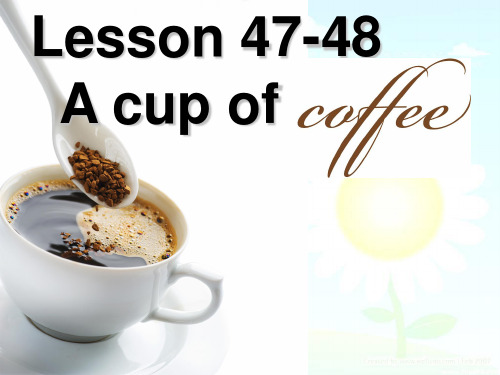
third room
Page 96. Exercise A
• 1 The aeroplane is flying ___o_ve_r_the village. • 2 The ship is going _u_n_d_er_the bridge. • 3 The children are swimming _a_cr_o_ss_the river. • 4 Two cats are running __a_lo_n_g_the wall. • 5 The boy is jumping ___of_f _the branch. • 6 The girl is sitting _b_e_tw_e_en_her mother and her
• Do you like coffee, Ann?
•
与
• I do my homework every day.
• 以上两句中的do一样吗?
• I do my homework every day. • 句中的do作实义动词(有实际意义的动词),
表“做”。 • 例: • do exercises 做练习 • do business 做生意 [‘biznis]
Lesson 47-48 A cup of
Kinds of coffee
Black coffee 纯咖啡
Blue Mountain 蓝山咖啡
蓝山咖啡产地牙买加,得名于加勒比海环抱之中的蓝山。酸味、甜味、 苦味均十分调和又有极佳风味及香气, 适合做单品咖啡,宜做中度烘培。蓝山咖啡是世界上最优越的咖啡, 牙买加的天气,地质结构和地势共同提供了理想的场所。
five fifth
5th
six sixth 6th
seven seventh 7th
新概念第一册Lesson-111-112课件(共36张PPT)

her ___________ always _______ the best.But he is
新概念英语第一册 Lesson 112 How do they compare?
不规则形容词的比较级
肯 a little 定 a few 否 little 定 few
不可数 much
可数 many
______ ______.
model/television
Mrs. Fridthoaelssno'tlike ltihkee expensive
too
_________________, buthsuhseba_n_d______ ____w_atnhtes price.Because it is ___m_i_ll_io_neaxrpeensive.She believes
_d_e_c_i_d_e__ liketoit. So theyo_n____i_n_st_all_m_e_n_t_s_ buy it _______ ____d_e_p_o_s_i_t __.oFf irst, they can pay 1a4 ________t_hr_e_e___y£e3a0rsand then £_____ a month for
This ring is worth at least $800. • worth doing sth.这本书值得一看。
• This book is worth reading.
• Can we buy it on installments? • buy …on installments 以分期付款的方式购买 • 你为什么不以分期付款方式购买这座房子?
• as…as…. 和….一样 • 你的兄弟和我一样高。
新概念英语第一册lesson3-4课件
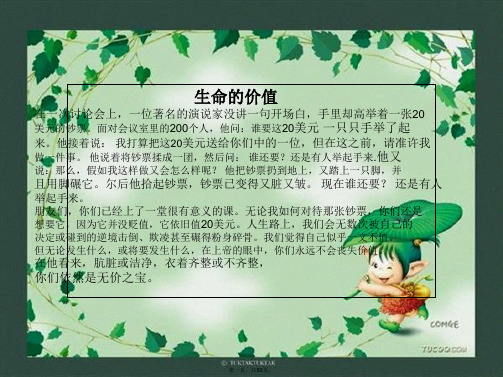
This is my book.
This is my watch.
Sorry ,sir .
为自己所犯的过失而道歉
第十五页,共50页。
???
Is this your umbrella ?
No ,it isn’t .
第十六页,共50页。
???
Is this It ? It 指代umbrella,避免重复
人称代词主格宾格形容词性物主代词名词性物主代词imemy我的mine我的youyouyour你的yours你的sheheitherhimitherhisits她他它的hershisits她他它的weusour我们的ours我们的youyouyour你们的yours你们的theythemtheir他们的theirs他们的excusemesorryexcuseme
第二十三页,共50页。
课文讲解
• Here is my ticket.
Here is my...
意思是这是我的。。。
比如:Here is my pen. 这里的my也可以换为其他人称的物主 形容词。 比如:Here is your/his/her book.
第二十四页,共50页。
This is not my umbrella
No, it isn’t. Is this it?
your umbrella
Yes, it is.
第三十页,共50页。
Sentence patterns 句型
Is this your…?
No, it isn’t.
变成否定,只需要在is后面加not
This is not (isn’t) my…
例句:Is this your coat?
- 1、下载文档前请自行甄别文档内容的完整性,平台不提供额外的编辑、内容补充、找答案等附加服务。
- 2、"仅部分预览"的文档,不可在线预览部分如存在完整性等问题,可反馈申请退款(可完整预览的文档不适用该条件!)。
- 3、如文档侵犯您的权益,请联系客服反馈,我们会尽快为您处理(人工客服工作时间:9:00-18:30)。
❖Lesson 83 Going on holiday度假
n.洗澡 ad.几乎,将近 a.准备好的,完好的 n.正餐,晚餐 n.饭馆,餐馆 a.烤的
n.早饭 n.理发 n.聚会
n.假日
Revision
1. Everyone says a phrase of “have”
2. Answer my questions: ①. Where’s Tom? What’s he doing? ②. What did Sam have? ③. Is dinner ready? ④. What time can they have dinner? ⑤. Where did they have lunch? ⑥. What are they going to have tonight?
Topics:
Where did you go on holiday last year?
Where would you like to go on holiday this year?
What do you need before you go on holiday?
suitcase
suitcase n. 手提箱 /’su:tkeis/
No, thank you. I have (just) had a cup. 我已经喝过一杯了.
<Ⅱ> They had some ice-creams
at 4 o’clock.
Would you like some ice-creams?
No, thanks. I’ve had an ice-cream. I had an ice-cream at four o’clock.
I have had my lunch.
• 否: I have not had my lunch. • 问:Have you had your lunch? • 答:Yes, I have. / No, I haven’t. • 对划线部分提问:What have you had?
我们通常这样缩写:
NCE
Grammar focus :
1. 谈论过去发生的事情,但是发生的时间 不重要.
e.g. She has broken her arm. 她伤了她的胳膊.
❖ 一般现在完成时通常与表示不确定的时间副 词或短语连用
❖ 如 just, already, before, never, ever, twice, three times等。
Answer the questions:
1. Did Sam have a cup of coffee? when?
Yes, he had one after lunch. 2. What’s Carol and Tom’s living room like?
Why? The room is very untidy. Because they are
❖ John’s wife left him for another man. ❖ 约翰的妻子舍他而去,投入另一个男子的怀抱。 ❖ ③ v. 留给,遗留;委托 ❖ ‘Leave it to me,’he said. ❖ “这事交给我来办吧,”他说道。
❖ The famous actress left all her money to charity.
Recite and act the text:
hi where upstairs bath here nearly cigarette whisky dinner nearly seven lunch went beef matter again
Dictation
Lesson 83 Going on holiday
Warm up
1.have译为“有,拥有” 时,它的疑问和否定形式 有两种: (1)用助动词引导 (2)由have本身引导
e.g.
I have a house in town.
I haven’t (got) a house in town. I don’t have a house in town.
3.过去开始的某事,现在还在继续 4.刚刚发生的事情
5.经历或取得的成就
现在完成时VS一般过去时
现在完成时构成:
主语 + have/has + V.过去分词
2. 谈论过去发生的某事,但对现在造 成了影响
e.g. She has broken her arm, so she can’t play basketball. 她伤了她的胳膊, 所以她不能打篮球 了.
3. 过去开始的某事,现在还在继续.
e.g. He has lived in China for 20 years. 他已经在中国住了20年了. He has lived in China since 1993. 4. 刚刚发生的事情.
↓
have是助动词,无实义
❖ 否定形式:
❖ hasn't/haven't + 动词的过去分词
❖ 疑问形式:
❖ 把 has/have 提前 ❖ I have had dinner. ❖ 否:I haven‘t had dinner. ❖ 疑:Have you had dinner? ❖ 肯:Yes,I have./ ❖ 否:No,I haven't.
Where did you go on holiday? I went to the mountains.
I went to the U.S.
Where did you go on holiday? I went to the beach.
Where did you go on holiday? I went to the zoo.
2.have译为“进行,从事”时,和名词或名词短
语构成短语。它的疑问和否定形式只能由助动词
引导。可以代替常用动词如:eat,enjoy,
drink , take等
e.g. 洗澡 have a bath 喝酒 have a drink 度假 have a holiday 看一下 have a look 抽支烟 have a cigarette 试一下 have a try 休息一下have a break 谈一谈 have a talk
❖ CAROL: Have a cup of coffee then.
❖ SAM: I've just had a cup, thank you.
❖
I had one after my lunch.
❖ TOM: Let's go into the living room, Carol.
❖
We can have our coffee there.
❖ CAROL: Hello, Sam. Come in.
❖ TOM: Hi, Sam. We're having lunch.
❖
Do you want to have lunch with us?
❖ SAM: No, thank you. Tom.
❖
I've already had lunch. I had at half past twelve.
❖ CAROL: Excuse the mess, Sam.
❖
This room's very untidy.
❖
We're packing our suitcases.
❖
We're going to leave tomorrow.
❖
Tom and I are going to have a holiday.
3.have也可以直接作助词 (现在完成时)
e.g.
I have been to Beijing for three years. Has Sam gone to New York?
breakfast早餐 have lunch午餐
brunch早中餐 supper晚饭 dinner晚餐(较丰盛)
bath
I have had… 我已经吃过/喝过/从事了…
I have had dinner.
I have had a cup.
↓吃
I have had an ice-cream.
↑ 助动词
现在完成时
构成:
I have had dinner.
现在完成时中动词形态
↑
S(主语)+ have/ has + 动词过去分词
❖ SAM: Aren't you lucky!
❖ TOM: When are you going to have a holiday, Sam?
❖ SAM: I don't know.
❖
I've already had my holiday this year.
❖ CAROL: Where did you go?
[bɑ:θ]
nearly
['niəli]
ready
['redi]
dinner
['dinə]
restaurant ['restərɔnt]
roast
[rəust]
breakfast ['brekfəst] haircut ['heəkʌt] party ['pɑ:ti] holiday ['hɔlidi]
